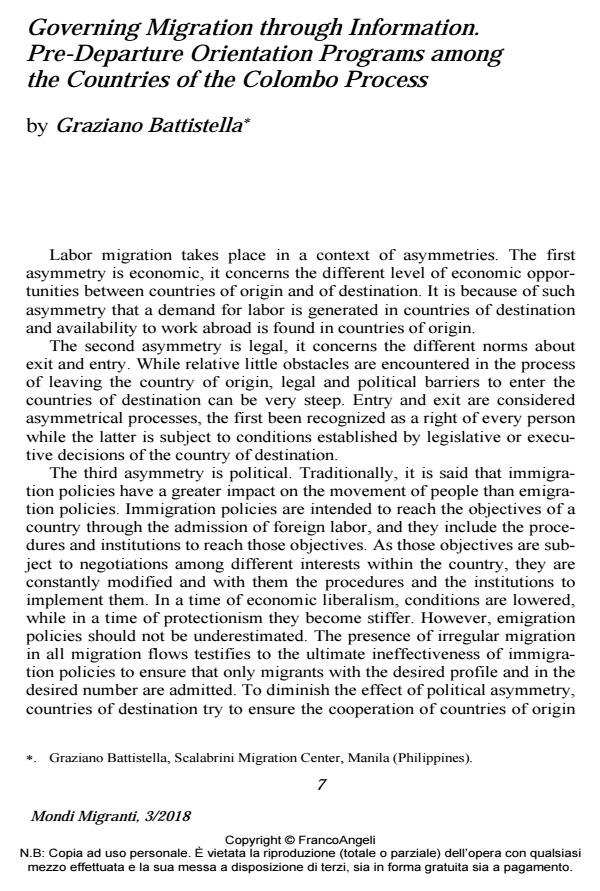Governing Migration through Information. Pre-Departure Orientation Programs among the Countries of the Colombo Process
Titolo Rivista MONDI MIGRANTI
Autori/Curatori Graziano Battistella
Anno di pubblicazione 2018 Fascicolo 2018/3
Lingua Inglese Numero pagine 19 P. 7-25 Dimensione file 211 KB
DOI 10.3280/MM2018-003001
Il DOI è il codice a barre della proprietà intellettuale: per saperne di più
clicca qui
Qui sotto puoi vedere in anteprima la prima pagina di questo articolo.
Se questo articolo ti interessa, lo puoi acquistare (e scaricare in formato pdf) seguendo le facili indicazioni per acquistare il download credit. Acquista Download Credits per scaricare questo Articolo in formato PDF

FrancoAngeli è membro della Publishers International Linking Association, Inc (PILA), associazione indipendente e non profit per facilitare (attraverso i servizi tecnologici implementati da CrossRef.org) l’accesso degli studiosi ai contenuti digitali nelle pubblicazioni professionali e scientifiche.
Migration is governed through instruments that increase or decrease the asymmetries that characterize the migratory phenomenon. One such asymmetry is the information asymmetry between migrants, employers and countries of destination. To provide migrants with accurate information on what they will face after migrating is to diminish the risks they will face. It is also an insurance to employers and countries of destination that migrants possess the minimum requirements for their insertion. Thus, information can be a useful tool to improve the governance of migration. This article examines the experience of pre-departure orientation programs provided by the countries of the Colombo Process as a case study. After comparing the various programs, the article suggests how to adopt a common program, also with the cooperation of destination countries. It also highlights the difficulties inherent in this process, which do not allow yet adopting a certified instrument for the reduction of information asymmetry.
Governare le migrazioni significa utilizzare strumenti che aumentano o diminuiscono le asimmetrie di cui la realtà migratoria è caratterizzata. Una di que-ste asimmetrie riguarda il livello di informazioni in possesso dei migranti, dei datori di lavoro e dei paesi di destinazione. Dotare i migranti di informazioni più accurate sul ciò che li aspetta significa diminuire il livello di rischio a cui vanno incontro come pure assicurare i datori di lavoro e i paesi di destinazione che i migranti possiedono le conoscenze minime per il loro inserimento. L’informazione, quindi, può essere uno strumento utile per migliorare la governabilità delle migrazioni. Questo articolo utilizza l’esperienza dei programmi di informazione prima della partenza utilizzati dai paesi membri del Colombo Process come caso di studio. Do-po un’analisi comparata dei programmi di informazione, l’articolo suggerisce come poter adottare un programma similare tra tutti i paesi, anche con la collaborazione dei paesi di destinazione, ma anche le difficoltà insite in questo obiettivo, che non permettono ancora di poter contare su uno strumento verificabile per la riduzione della asimmetria di informazione.
Parole chiave:Asimmetria di informazione; governare le migrazioni; Colombo Process.
Graziano Battistella, Governing Migration through Information. Pre-Departure Orientation Programs among the Countries of the Colombo Process in "MONDI MIGRANTI" 3/2018, pp 7-25, DOI: 10.3280/MM2018-003001